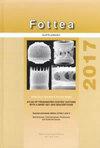北美洲罕见淡水藻类四孢子虫(金藻科,绿藻门)的首次记录
IF 1.4
3区 生物学
Q3 PLANT SCIENCES
引用次数: 4
摘要
本文报道了北美首次记录到的褐藻四孢子藻(Tetrasporopsis fuscescens),并通过光镜和透射电子显微镜、细胞化学和分子系统发育分析进行了证实。fuscescens很少被记录,只在12个河流地点的底栖动物中被发现:9个在南加州,3个在北加州。超过一半的河流是非多年生的,其特点是长时间的干旱。四孢子虫细胞呈金黄色,呈球形,有明显的壁,聚集在宏观胶状菌落的周围,菌落开始呈管状或囊状结构,但后来变成膜状。细胞有1-2个顶叶叶绿体,没有柱头或类核蛋白,通过纵向细胞分裂进行生殖。该属的其他特征如下:菌落中的细胞也分裂成看起来更小的带有残余细胞壁的自孢子,菌落粘液由从菌落中心辐射的圆柱形二分分枝管组成,这些管附着在周围细胞上,老细胞充满了大的油滴。核SSU rDNA、质体rbcL、psaA、psbA和psbC序列的组合基因树分析表明,欧洲和美国的fuscesensis标本形成了一个分支,与chrysomophyceae纲的分类群聚在一起。本文章由计算机程序翻译,如有差异,请以英文原文为准。
First record of the rare freshwater alga Tetrasporopsis fuscescens (Chrysomerophyceae, Ochrophyta) in North America
This study presents the first record of the ochrophyte alga Tetrasporopsis fuscescens in North America, confirmed with light and transmission electron microscopic photomicrographs, cytochemical and molecular phylogenetic analyses. T. fuscescens was recorded rarely, being found in the benthos of only twelve stream sites: nine locations in Southern California and three in Northern California. More than half of the streams were non-perennial, characterized by long dry periods. Tetrasporopsis cells were gold-colored, spherical, with a distinct wall, assembled in the periphery of macroscopical gelatinous colonies, which start as tubular or sac-like structures, but later become membranous. The cells have 1-2 parietal chloroplasts, without a stigma or pyrenoid, and reproduction occurs by longitudinal cell division. Other features of the genus are as follows: cells in the colonies also divide by what appears to be smaller autospores with remnant cell walls remaining, the colonial mucilage consists of cylindrical dichotomously branched tubes radiating from the center of the colony to which attach the peripheral cells, and older cells become filled with large oil droplets. A combined gene tree of sequences from nuclear SSU rDNA, plastid rbcL, psaA, psbA and psbC showed that T. fuscescens specimens from Europe and U. S. A. formed a clade, which clustered with taxa classified in the class Chrysomerophyceae.
求助全文
通过发布文献求助,成功后即可免费获取论文全文。
去求助
来源期刊

Fottea
生物-植物科学
CiteScore
4.00
自引率
9.10%
发文量
20
审稿时长
>12 weeks
期刊介绍:
Fottea is a journal of Czech Phycological Society (formerly bulletin Czech Phycology). Fottea publishes papers on all aspects of the ecology, physiology, biochemistry, cell biology, molecular biology, systematics and uses of algae (including cyanobacteria)
 求助内容:
求助内容: 应助结果提醒方式:
应助结果提醒方式:


